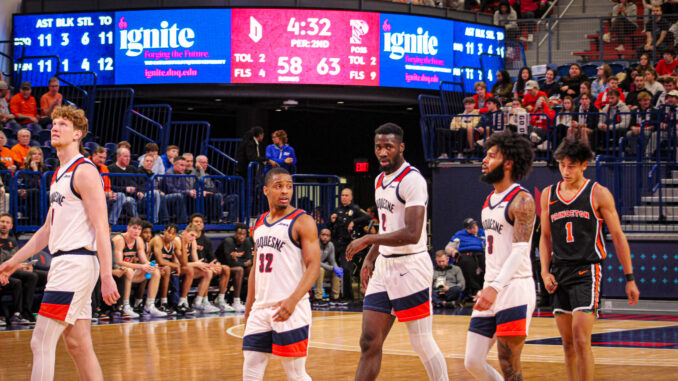
Spencer Thomas | Sports Editor
Princeton pounced on Wednesday night, using timely shooting and stiff defense to hand Duquesne its first loss of the season, 70-67. The thrilling affair came down to the final shot, but the Dukes weren’t able to sink a contested close-range shot, and Princeton survived to move to 3-0, while Duquesne fell to 3-1.
“It does hurt. I have to be honest,” said guard Kareem Rozier.
Princeton is a much smaller and more mobile team than anyone that Duquesne has faced this year. No starter stood more than 6-feet, 7-inches tall, and they stretched all around the perimeter on both sides of the ball.
“It’s a tough team to play early in the year,” said Head Coach Keith Dambrot. “Their tempo control, they get it in their best players’ hands. They run that Princeton stuff.”
It forced Duquesne’s big men to be more agile and dynamic in both their rebounding and defending.
“They move you around so much that you lose sight of the ball sometimes, and if you don’t guard the ball well, there’s not as much help,” Dambrot said. “We didn’t have great energy.”
It didn’t help that some of Duquesne’s most athletic forwards weren’t available. Tre Williams remains out with a dislocated thumb that should sideline him for several more games. Fousseyni Drame was limited due to some early foul trouble.
“We have enough guys,” Dambrot said. “I would say it didn’t affect us, but it did.”
Duquesne also suffered from a sloppy start when adjusting to the Tigers’ distinct play style. They were hampered by seven turnovers and temporarily lost Jimmy Clark and Drame to minor injuries in the first 10 minutes.
Despite their lack of size, Princeton did a fantastic job managing Duquesne’s big men in the paint. They pushed very far outside and simply would not allow the Dukes to possess near the rim. Either through dribbling or passing, they willed the ball to low-percentage shooting areas that left Duquesne with bad shots.
“They walled us up down low,” Rozier said. “We’ve just got to do better in that area. Be ready to shoot the ball when we come out.”
That meant that, at points, the game felt like a shooting contest, and the winner would be determined by whomever contested the other team’s jump shots better. If long range wasn’t falling for Duquesne, they were in deep trouble. It was a bad night for Duquesne’s core guards to shoot a season-low 28% from beyond the arc. Only one player on the entire team made multiple 3-pointers. It was Jimmy Clark, with two.
“Lost by [3], with a shot to win, and we shot bad,” Rozier said. “We’ll be alright.
“It just wasn’t our night tonight, but that’s okay,” he said.
The deficit reached a low point of 9 in the second half, but Duquesne was let back into the game by an increasing trend: Princeton’s fouls. Even when the field goals weren’t falling, Duquesne kept getting to the line. Eleven second-half free-throws let Duquesne back in the game.
Duquesne also generally lacked the high-power scoring runs they enjoyed in the first three games of the season. Any time it felt like the Dukes had some momentum, one of Princeton’s shooters would bang in a corner three. No span of time felt like it spelled doom, but rather the accumulation of small moments. Duquesne was also held scoreless for a 5:07 span in the second half, the second time the offense had dried up during that window. By the end of the game, Duquesne had been outshot from the field by a 10% margin.
It was a bitter loss for Duquesne but seemed less like a problem with the talent on the floor than its ability to cope with Princeton’s game. The Tigers relentlessly imposed their will from beginning to end.
The final minutes were as tight as could be, though Princeton never lost their lead.
Dae Dae Grant hit a pair of free throws to bring the Dukes within one. They got a defensive stop and had a possession with 43 seconds left. However, Grant was stripped. Rozier nearly stole it right back, but after a dog pile on the loose ball, the possession arrow went the Tigers’ way. Duquesne got another stop, without even needing to foul. Out of timeouts with 10 seconds left, they rushed up the court. Drame drove in but barely missed his game-winning attempt with less than half a second left.
Dambrot was questioned after the game about his decision to burn his final timeout on the penultimate possession, which allowed Princeton’s defense to get set. In all his wisdom, the 65-year-old knows better than to second guess himself.
“I’ve got my big-boy pants on, I think I can take anything anybody can throw at me,” Dambrot said. “I don’t think you can get any better than a 2-foot jumper in the paint. I’ll take that every damn day of the week.”
Another reason Rozier said the loss stings is the energy of the crowd and the opportunity the game presented to build real momentum in the fanbase. Over 2,877 fans packed Cooper Fieldhouse. After “Renegade” by Styx played on the loudspeaker, and Princeton suffered a shot clock violation on their first possession, the arena felt as loud as it’s ever been.
“We had a live crowd tonight,” Rozier said. “But if they’re really fans, they’ll be back. And we will bounce back, and we’ll keep fighting.”
However, Rozier sees the loss as an opportunity to learn.
“It’s building us for when we get to the A-10 Championship. It’s building us for when we get to the tournament,” he said. “I truly believe this is the team that will be able to do it.”
It’ll be another quick turnaround for the Dukes, as they host Rider on Friday night at 7.

